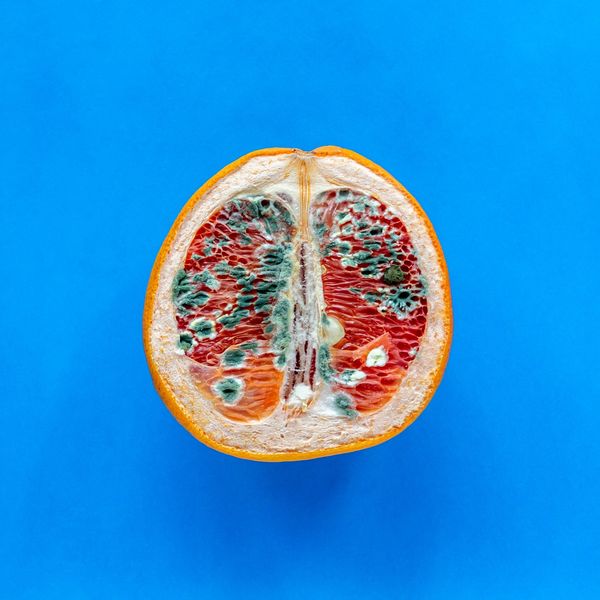While tea is the kind of drink that those of us who are tea lovers typically consume all throughout the year, I'm pretty sure I'm not alone when I say that there is nothing like looking out of the window on a chilly day while it's raining, curling up under a favorite throw blanket and sipping on a warm cup of herbal tea while reading a book or watching a favorite throwback movie. What's so dope about herbal tea is, aside from it tasting pretty good (especially when it's got some honey and/or lemon in it) is all of the health benefits that it provides. Herbal tea is proven to boost your immunity, de-stress you, fight off free radicals and viruses, improve your digestive system, fight inflammation, and oh so much more.
I'm personally such a fan of the stuff that I once wrote an article for the platform entitled, "10 'Uncommon' Teas You Should Add To Your Stash (& Why)." Today, though, I'm going to share with you a list of teas that are specifically good for your overall vaginal health. That way, if you do decide to cop a couple of 'em, you can be confident that not only will they be soothing to your soul but great for your va-jay-jay too.
1. Burdock Root
Burdock root tea is really good for you, first of all, because it's packed with all kinds of antioxidants. That's why it's got such a great reputation for being able to reduce bodily inflammation and detoxify your blood. In fact, it detoxifies so well that it's been known to inhibit the growth of certain cancer cells and help to ease the symptoms that are associated with eczema. Some other benefits of this particular tea include that it's able to lower your blood sugar levels and that it works as a diuretic. What makes burdock root great for your vagina is it contains properties that can help to balance your hormones as well as strengthen your uterine walls. A must-have, for sure.
2. Chamomile
When it comes to teas that are able to effectively reduce stress levels, it's pretty common for chamomile to top the list. Aside from that, it's also got anti-estrogenic effects that can increase bone density, compounds that can help to reduce symptoms that are associated with the common cold, and, thanks to all of the antioxidants that it has, chamomile is even known to improve heart health and boost immunity. As far as vaginal health goes, if period pain drives you totally up the wall, the anti-inflammatory properties in this tea can significantly reduce any discomfort you may feel. The key is to consume it all month long, though, not only when you're on your cycle.
3. Chasteberry
While chasteberry may not be the kind of tea that comes up in regular conversation, that doesn't make it any less valuable or relevant. In fact, when it comes to women's health, it's considered to be top-tier. That's because the properties in this tea are able to do everything from increase fertility and make producing breast milk easier to reducing PMS and menopause-related symptoms.
The reason why is because chasteberry has powerful enzymes and compounds in it that are able to stimulate estrogen levels in your system. So, whether trying to conceive or getting through menopause is what you want to do, a warm cup of chasteberry can help to make things so much better.
4. Cinnamon
If you're all for something that's a combination of sweet 'n spicy, you definitely need to invest in some cinnamon tea. It's another tea that's high in antioxidants. It also lowers inflammation and blood sugar levels, promotes collagen production (which keeps you looking younger) and it can even help to increase cognitive function (dope). And just what does cinnamon do for your vagina's overall health and well-being? For starters, it helps to reduce PMS-related symptoms. Also, because of the powerful antibacterial and antifungal properties that it contains, consuming cinnamon tea a couple of times a week is a proactive way to keep vaginal infections at bay as well.
5. Ginger
Another pretty spicy tea is ginger. But listen here, if you happen to have a bout of morning sickness, motion sickness, or nausea, you will be more than just a little happy that this is in your stash. Ginger also has a good amount of anti-inflammatory properties in it which makes it pretty effective when it comes to helping to relieve headaches and even migraines. Some other reasons to drink this particular tea is it's rich in the kind of antioxidants that can help to prevent cancer cells, it has a lot of antimicrobial properties to speed up the healing process of a cold and it's loaded with antifungal properties that are great for maintaining good oral health.
There are also properties in ginger that can help to relieve muscle contractions that are typically associated with period cramps. Plus, because ginger is effective in keeping your gut healthy, that means you've got a greater chance of warding off the kind of bad bacteria that can ultimately trigger a yeast infection or bacterial vaginosis.
6. Green Tea
If there is a tea that is above all teas, it would probably have to be green tea. It actually has a reputation for being one of the healthiest teas on the planet and it is well-deserved. Green tea is full of antioxidants that are great for your brain, weight loss, and protecting your system from cancer. Green tea also has polyphenols that reduce bodily inflammation, antioxidants called catechins that help to prevent cell damage, and properties that fight off germs that cause bad breath.
Some other great things about this tea are it helps to prevent heart disease and type 2 diabetes as well as strengthen your bones. And why does green tea please your vagina so? Well, remember the catechins that I mentioned earlier? Something else that they do is protect your urinary tract. This is great because that can significantly decrease your chances of having a UTI — and if you've ever had one of those before, you know you want to avoid getting those bad boys at all costs if you can.
7. Lemon
Lemon tea is good for you because it's full of Vitamin C. In Vitamin C, there is citric acid that can help to cleanse your liver and ultimately detox your system. Lemon tea also has astringent properties in it that work to combat acne and give your skin an overall radiance and youthful appearance. Something else that's cool about this particular kind of tea is it's got plant flavonoids that can help to lower your cholesterol levels as well as properties that can help to heal inflamed gums and restore oral health. As far as your vaginal health goes, the acidic nature of the tea is great at helping your vagina to maintain its pH levels as it also fights off free radicals and keeps your immune system up so that it's harder for you to get vaginal infections.
8. Rooibos
The first time I recall having a cup of rooibos tea was the first time I went to South Africa. To me, the best way to describe it is, if you're looking for a coffee (tasting) substitute, it's one to strongly consider. And why is it so good for your health? Rooibos can assist with supporting your weight loss plan; the alpha hydroxy acid that's in it can help to improve your skin's appearance; it has the bioactive flavonoid chrysoeriol that can reduce allergy-related symptoms; it's rich in antioxidants that can help to boost your immunity and it's caffeine-free if, again, you're trying to get less of a caffeine fix.
The anti-inflammatory properties in rooibos can help to reduce period-related pain because the properties in this tea are able to stimulate the production of potassium in your system. Also, the antioxidants aspalathin, nothofagin, and quercetin are great because they can decrease oxidative stress, including in your vaginal area. This is good to know because this kind of stress has been directly linked to fibroids, endometriosis, and the overproduction of vaginal mucus.
So, what are you waiting for? Rooibos is just waiting to do your body good — vagina and all!
To learn more about all things vaginal health and wellness, check out the xoNecole Women's Health section here.
Featured image by Getty Images
- Drinking Matcha Green Tea Health Benefits - xoNecole: Women's Interest, Love, Wellness, Beauty ›
- Drinking Matcha Green Tea Health Benefits - xoNecole: Women's Interest, Love, Wellness, Beauty ›
- Tea For Better Sex: Does It Work? - xoNecole: Women's Interest, Love, Wellness, Beauty ›
- Foods That Increase Vaginal Lubrication Naturally - xoNecole: Lifestyle, Culture, Love, & Wellness ›
- What Happens To Your Vagina When You Stop Having Sex? - xoNecole ›
- Best Teas For Beauty, Healthy Glowing Skin, Aging - xoNecole ›
- New Year's Resolutions For Your Vagina - xoNecole ›
- Watery Discharge: What Does It Mean? Unhealthy Discharge - xoNecole ›


























